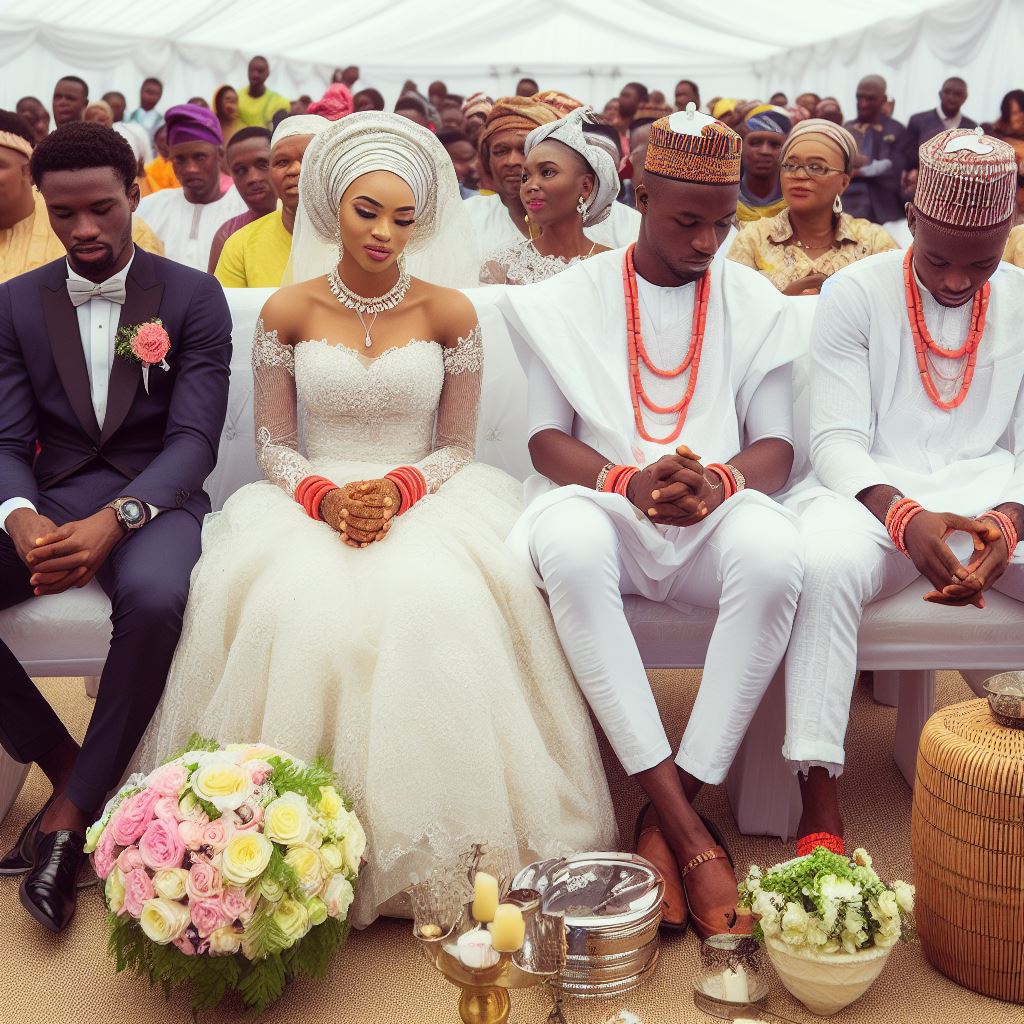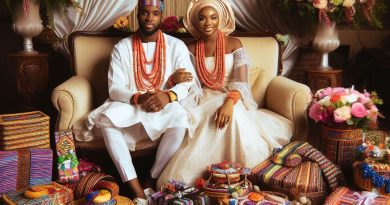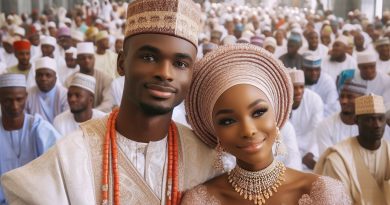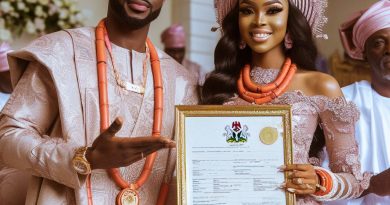The Evolution of Marriage Views among Nigerian Youth
Last Updated on October 18, 2023
Introduction
Nigerian youth demographic comprises individuals aged 18-35.
The evolution of marriage views among Nigerian youth reflects societal shifts and changing priorities.
Thesis statement: This blog post will explore the changing perspectives on marriage among Nigerian youth.
The institution of marriage has long been a cornerstone of Nigerian society.
Traditionally, it marked the transition to adulthood and was highly valued.
However, as Nigeria has undergone significant social and economic changes, so too have the perspectives of its youth on marriage.
In this section, we will delve into the evolving viewpoints of Nigerian youth when it comes to this pivotal life decision.
We’ll explore how factors like education, urbanization, and gender roles have influenced their beliefs and expectations regarding marriage.
Moreover, we’ll discuss the implications of these changing views on family structures, gender dynamics, and societal norms.
Join us on this journey to gain insight into the complex and fascinating world of marriage views among Nigerian youth.
Traditional View of Marriage
Cultural and religious influence on marriage beliefs
- Nigerian youth’s view of marriage is heavily influenced by cultural and religious beliefs.
- The culture emphasizes the importance of marriage as a social institution.
- Religious teachings promote the sanctity of marriage and the concept of lifelong commitment.
- Traditional beliefs dictate that marriage should be between a man and a woman.
Arranged marriages and parental involvement
- In traditional Nigerian society, arranged marriages were prevalent among the youth.
- Parents played a significant role in selecting suitable partners for their children.
- Arranged marriages were seen as a way to maintain family and cultural ties.
- Parental involvement ensured compatibility and consideration of social status.
Importance of chastity before marriage
- Nigerian youth hold chastity in high regard before marriage due to cultural and religious norms.
- Pre-marital sex is often frowned upon and seen as morally wrong.
- Virginity is considered a virtue, and it contributes to a person’s desirability as a spouse.
- Chastity is believed to strengthen marital bonds and foster trust and loyalty.
Gender roles and expectations within marriage
- Traditional Nigerian society assigns specific gender roles and expectations within marriage.
- Men are expected to be providers and protectors of the family.
- Women are typically responsible for domestic duties and child-rearing.
- Gender roles are reinforced through cultural practices and family values.
In fact, the traditional view of marriage among Nigerian youth is deeply rooted in cultural and religious influences.
Arranged marriages and parental involvement are common, while the importance of chastity before marriage holds significant value.
Gender roles and expectations within marriage also play a crucial role in shaping views on matrimony.
These traditional beliefs continue to shape the perspectives of Nigerian youth towards marriage, although modern influences are gradually challenging and evolving these age-old norms.
Read: Financial Implications of Divorce under the Nigerian Marriage Act
Shift towards Modern Perspectives
Over the years, Nigerian youth have witnessed a significant shift in their views and attitudes towards marriage.
This transformation can be attributed to a variety of factors, including the influence of globalization and westernization, the emphasis on personal choice and individuality, the rise of love-based marriages, increased acceptance of interethnic and interreligious marriages, and the impact of education and career aspirations on marriage decisions.
Influence of globalization and westernization
As Nigeria becomes more interconnected with the rest of the world, the influence of globalization and westernization has played a crucial role in shaping the perspectives of Nigerian youth regarding marriage.
Exposure to different cultures, values, and norms has led to a gradual erosion of traditional marriage ideologies.
Emphasis on personal choice and individuality
Nigerian youth today prioritize personal choice and individuality when it comes to marriage.
They value the freedom to choose their own partners based on compatibility, shared values, and emotional connection.
This shift reflects a growing belief in the importance of personal happiness and fulfillment within the institution of marriage.
Rise of love-based marriages
In contrast to the past, where arranged marriages were prevalent, Nigerian youth are now more inclined towards love-based marriages.
They seek romantic relationships that are built on trust, companionship, and mutual respect.
Love has become a crucial factor in determining the success and longevity of a marriage.
Increased acceptance of interethnic and interreligious marriages
Nigerian youth are increasingly open to interethnic and interreligious marriages.
As societal barriers break down, individuals are willing to cross cultural and religious boundaries in their pursuit of love and companionship.
This trend reflects a growing acceptance and celebration of diversity in Nigerian society.
Impact of education and career aspirations on marriage decisions
The pursuit of education and career aspirations has greatly influenced the marriage decisions of Nigerian youth.
With more opportunities for higher education and professional growth, young Nigerians are prioritizing their personal and professional development before settling down.
Financial stability and independence have become important considerations in choosing a life partner.
In general, the evolution of marriage views among Nigerian youth is evident in the shift towards modern perspectives.
The influence of globalization and westernization, the emphasis on personal choice and individuality, the rise of love-based marriages, increased acceptance of interethnic and interreligious marriages, and the impact of education and career aspirations have collectively transformed the way Nigerian youth perceive and approach marriage.
These changes reflect a more progressive, inclusive, and individualistic outlook on marriage, aligning with the changing dynamics of Nigerian society.
Read: A Guide to Writing Personalized Marriage Wishes in Pidgin

Challenges and Controversies
Clash between traditional and modern views
The evolution of marriage views among Nigerian youth brings about a clash between traditional and modern perspectives.
Traditional views emphasize arranged marriages, while modern views lean towards love and compatibility.
Pressure to conform to societal and family expectations
Nigerian youth often face immense pressure to conform to societal and family expectations when it comes to marriage.
Traditional beliefs and cultural norms play a significant role in shaping these expectations.
Rising divorce rates and its effect on perceptions of marriage
The increasing divorce rates in Nigeria have influenced the way Nigerian youth perceive marriage.
They are more cautious and hesitant, fearing the possibility of experiencing failed marriages themselves.
The role of social media in shaping marriage perceptions
Social media has become a powerful influence in shaping marriage perceptions among Nigerian youth.
Platforms such as Instagram and Facebook often portray idealized versions of married life, creating unrealistic expectations.
Read: Nigeria’s Cross-Cultural Marriage Wishes & Their Beauty
Factors Influencing the Evolution
Media portrayal of relationships and marriage
- The media plays a significant role in shaping the views and expectations of Nigerian youth regarding relationships and marriage.
- Movies, television shows, and social media platforms often present idealized versions of love and romance.
- These portrayals can create unrealistic expectations and standards for relationships among Nigerian youth.
- Popular culture often emphasizes materialistic aspects of relationships, such as luxurious weddings and extravagant lifestyles.
- This can lead to a focus on superficial aspects rather than the emotional connection and compatibility between partners.
- Nigerian youth may be influenced by these media portrayals, leading to a shift in their marriage views.
Changing gender dynamics and women empowerment
- Traditional gender roles in Nigerian society are gradually evolving, particularly with regards to women empowerment.
- There is an increasing recognition of the importance of gender equality and women’s rights.
- As women gain more opportunities for education and career advancement, their perspectives on marriage are changing.
- Women are now more likely to prioritize personal growth, independence, and self-fulfillment before considering marriage.
- Gender dynamics are shifting, with both men and women redefining their roles and expectations within relationships.
Influence of peer relationships and experiences
- Nigerian youth are heavily influenced by their peers and the experiences of those around them.
- Observing the successes and failures in relationships among their friends can shape their own views on marriage.
- If they witness healthy and supportive relationships, they may aspire to find similar partnerships.
- Conversely, negative experiences of friends, such as divorce or infidelity, may lead to a more cautious approach towards marriage.
- Peer pressure and societal expectations also play a role in shaping the evolving views of Nigerian youth regarding marriage.
Economic factors and financial considerations in marriage decisions
- Economic factors and financial considerations significantly influence marriage decisions among Nigerian youth.
- Traditionally, marriage was seen as a means to consolidate wealth and secure economic stability.
- However, as Nigerian youth face economic challenges, financial considerations have become more prominent.
- Young people are increasingly prioritizing financial independence and stability before committing to marriage.
- The high costs associated with weddings and starting a family also contribute to the evolving views on marriage.
- Many Nigerian youth are delaying marriage or opting for alternative relationship models due to financial constraints.
Overall, the evolution of marriage views among Nigerian youth is influenced by various factors.
The media’s portrayal of relationships and marriage, changing gender dynamics, peer relationships and experiences, and economic factors all play significant roles in shaping these views.
As Nigerian society continues to progress and adapt to new social, cultural, and economic dynamics, the evolution of marriage views is likely to continue.
Read: Heartfelt Marriage Messages for a Nigerian Best Friend
Conclusion
In this blog post, we explored the evolution of marriage views among Nigerian youth.
Understanding this evolution is significant as it helps us comprehend the changing dynamics of relationships.
How can we adapt our societal norms to embrace these changing marriage views?
What steps can we take to ensure our youth’s perspectives are valued and considered?
Let us continue this dialogue and strive to create a progressive and inclusive society.


